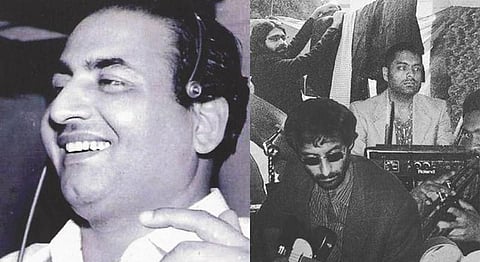
- HOMEGROWN WORLD
- #HGCREATORS
- #HGEXPLORE
- #HGVOICES
- #HGSHOP
- CAREERS
- ABOUT US
- CONTACT US

Often time, the first thing we notice about a song is the melody, the sounds and how it makes you move. The songs you hear at a party are not played because their words have power but because the beat makes you groove. So, how often do we really sit and pay close attention to what the songwriter has to convey through their lyricism?
Existentialism is a philosophical approach to viewing life and its durability and mortality. It initiates all conversation with the existence of a human at the centre. Contemplation about life and seeing it through a grey lens becomes thousands of theories, books and poems that have emerged out of this idea and found a place in modern literature and art. Indian artists have historically haven’t shied away from the idea either.
I. Main Pal Do Pal Ka Shayar Houn by Mukesh
Sung by Mukesh, this song was used in the movie Kabhi Kabhie. It talks about time and how fleeting it is. The lyrics convey that time within a person’s existence is temporary and unreliable, to the existence that it all seems a mere two seconds long. He explains that his existence is linked to his artistry, his poetry and his story, which is why his life seems to vanish away in the blink of an eye similar to the things that keep him amused in life.
“Main pal do pal kaa shaayar hoon
pal do pal meri kahani hai
pal do pal meri hasti hai
pal do pal meri javaani hai”
The type of existentialism invoked here is a common notion of time and mortality. The lyrics tell us that the fear of losing your youth signals the idea of losing the will to have a purpose to live. We interpret that in this idea of existentialism, it isn’t just life that is temporary but every aspect or motivator of life.
II. Heera by Peter Cat Recording Co.
The Indian Band Peter Cat Recording Co. released this song in 2019 as part of their album Bismillah. A song about having no friend, no money and absolutely no hopes in life, PCRC writes on the internal struggle of having to put up the performance of existing. The song repeatedly says, “I could live a lovely lie” pointing to the fact that existence seems lovely only when we lie to ourselves and to the people who see us existing.
“Maybe I’m an act
The kind who fails again
I’m ticking like a time bomb
So give me what I need
To suffer in peace
Living on an island”
Conversing about putting on an act, the songwriter goes on to say that despite their effort to put on an act, they fail endlessly. The existentialism of this song is nihilistic in essence. It finds comfort in suffering and finding peace in not putting up the act of existence.
III. Zinda by Amit Trivedi
Released as a part of the Soundtrack for the 2013 movie Lootera, Zinda is composed by Amit Trivedi. The existentialism of the song is pronounced clearly in its refrain where the lyricist says “Mujhe chod do mere haal pe, zinda houn yaar kaafi hain”. As an ode to loneliness, the writer says that he wants to be left completely alone and he doesn’t mind it because for him, being alive is enough. The philosophy of this song can either be seen as nihilistic or purely optimistic.
“Hawaaon se jo maanga hissa mera
To badle main hawa ne saans di
Akelepan se chhedi jab guftagu
Mere dil ne aawaaz di
Mere haathon, hua jo qissa shuru
Usey poora toh karna hai mujhe
Qabr par mere sar utha ke khadi ho zindagi
Aise marna hai mujhe”
The message can be one of the singularities of life where an individual is happy to be alive and does not pay head to any other sadness in life. It can also be seen as a song of frustration where existence feels like a punishment. Loneliness or any other sadness does not hurt the individual for existence itself is too much of a burden to carry.
IV. Main Zindagi Ka Saath Nibhata Chala Gaya By Mohammad Rafi
Sung by Mohammad Rafi and featured in the movie Hum Dono, this song puts a positive and optimistic spin on existentialism. It talks about existence as an animate and live being to convey that despite living it, the writer carries it along like a companion. It’s a song that acknowledges loss and grieving but expresses that they don’t need to be treated as the dominant factors of life.
“Main zindagi ka sath nibhata chala gaya
Har fikra ko dhuyein mein udata chala gaya
Har fikra ko dhuyein mein uda
Barbadiyon ka sog manana fizool tha”
If you enjoyed reading this, we suggest you also read:
